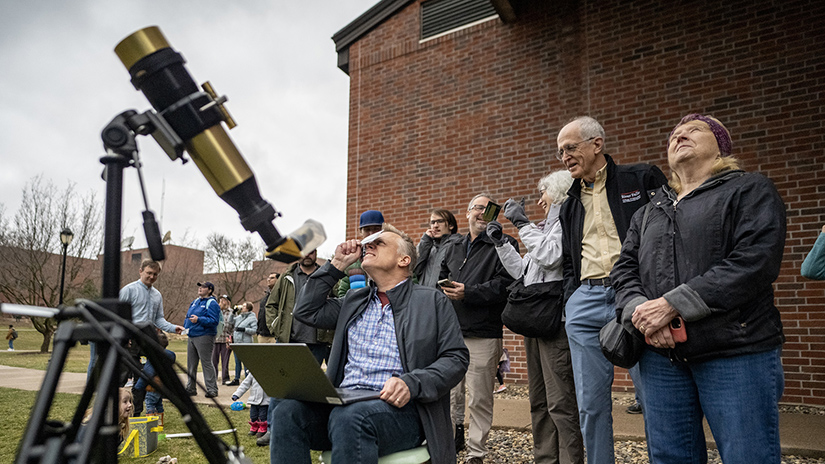UNIVERSITY OF WISCONSIN River Falls
Newsroom
UW-River Falls Physics Professor Glenn Spiczak, seated, looks at the solar eclipse through a protective shield Monday afternoon with other faculty, staff, students and community members. Overcast skies spoiled the view for most in the upper Midwest, but the event still brought out many to Centennial Science Hall to catch a glimpse of some change in the sky and learn more about the phenomenon.
Totally eclipsed: UW-River Falls hosts gathering for solar occurrence
Happening not visible in River Falls; event highlights university’s astronomy research
April 9, 2024 – One moment the moon nearly blotted out the sun, with only a curved sliver of light showing around the edge of the moon’s dark body. Then the moon moved a bit more, completely blocking the sun’s brightness.
“There, it happened. The total eclipse,” Glenn Spiczak, physics professor at the University of Wisconsin-River Falls, said April 8 as he pointed to a laptop screen in front of him.
Unfortunately, such a clear vision of the eclipse was not possible in person in River Falls, thanks to overcast skies that spoiled onlookers’ view of the total solar eclipse celebrated by people around the world Monday. Instead, Spiczak noted the eclipse occurring in Mazatlán, Mexico, shortly after 1 p.m. Central Standard Time as it played out on a computer screen.
Spiczak was joined by about 50 people outside of Centennial Science Hall hoping to see the event that was last visible from the contiguous U.S. in 2017 and won’t be again until 2044.
People gathered to view the solar eclipse, some donning protective eyewear, looked skyward, hoping for the clouds to clear and offer them a view of the much-anticipated celestial happening. Their anticipation grew as total solar eclipses happened on Spiczak’s screen on locations across the U.S., moving toward River Falls.
With each eclipse, Spiczak described to onlookers the details of the events playing out on his screen. Even when a solar eclipse happens, he explained, bright light emanates from the eclipse’s edges because of solar energy.
“You can get some really beautiful images when an eclipse occurs,” he said.
Spiczak’s affinity for all things solar system was evident during the solar eclipse, a fondness shared by UW-River Falls students studying physics and astronomy. They are involved in doing high-level research with neutron monitors in collaboration with the IceCube South Pole Neutrino Observatory at the geographic South Pole.
Last semester, one of his students conducted similar research with neutron monitors at another site in Greenland, Spiczak said. Other students are studying to what extent the moon’s movement impacts the sun’s cosmic rays.
“These are the kinds of things that our students are conducting important research on,” Spiczak said. “They are helping the scientific community make progress on some of the big issues.”
Some of those gathered at UWRF to view the solar eclipse were knowledgeable about such events, while others were simply there to experience an event that captured global attention. They spoke hopefully when the sky lightened momentarily, then were resigned to not being able to view the solar eclipse when the clouds remained. Several mentioned the last total solar eclipse in 2017, which they were able to view on campus.
Paige Donnelly, a junior from Edina, Minn., majoring in communication sciences and disorders, and her friend Gretchen Casper, a junior from Chicago majoring in environmental science, had planned to travel south to view the solar eclipse. They decided against that because of travel concerns prompted by so many others heading south and had hoped the clouds would part shortly after 2 p.m. in River Falls when the eclipse was occurring overhead.
Donnelly, Casper, and others noticed the sky darken a bit a couple of minutes past 2 p.m. But cloudy skies meant the solar eclipse happening overhead wasn’t visible. Onlookers waited a few minutes, wishfully discussing what they were missing as some viewed another live eclipse happening elsewhere on Spiczak’s screen. Then the group dispersed.
“I thought we might get lucky and see it,” said Dolly Shoemaker, ‘97, who had traveled to campus from nearby Beldenville to view the eclipse. “I’m still glad I came. It was fun to be a part of this, and to know that other people around the world did get to see it.”
.












